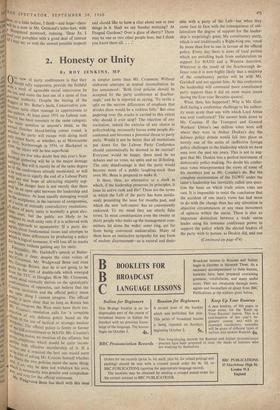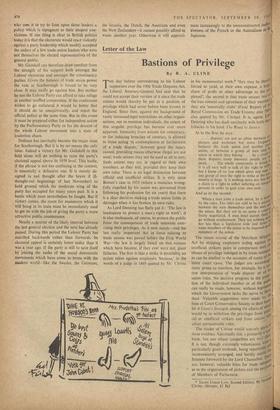2. Honesty or Unity By ROY JENKINS, MP view of
party conferences' is that they vicishould rally supporters, provide the faithful NE, „ith i a week of agreeable social intercourse by inesea, and make the best use of a spate of free fillanonal publicity. Despite the baying of the teggers at Mr. Butler's heels, Conservative con- te,r.ellees quite often manage to approximate to ifis Pattern. At least since 1951 no Labour con- Taehreencineahinas been remotely in the same category. question in anyone's mind, as the ‘ovrihneuttailerPthctober blood-letting comes round, is -..e party will escape with doing itself innlY,„Tinor harm, or whether, as at Morecambe 1;,"32, Scarborough in 1954, or Blackpool in e injury will be less superficial. kW,, There are few who doubt that this year's Scar- uorott cate gathering will be in the major damage a, gory. But will it merely be of the same degree i-t-bat the conferences already mentioned, or will withe such as to signify the end of a Labour Party Por ,)anY real hope of attracting majority sup- rnavt-fhe danger here is not merely that there the be an open split between the leadership and be uelonference. At least equally damaging would a se acceptance, in the interests of compromise, ,A showof Party unity is normally a great elec- ,01,11 tad atttg asset, but the public are likely to be soleted by such unity only if it is achieved with tt,' aPproach to spontaneity. If a party dis- -trees 00 tee() .about fundamental issues and attempts to vi rt, whichese differences by producing a policy non for Is logical nonsense, it will lose all its marks honesty without gaining any for unity. be s °r.ttida.telY, Mr. Gaitskell's speech at Batter- f het Mr' Made it clear, despite the siren voices o Ile Mr' 1.ossnian, Mr. Wedgwood Benn and even the r' 'George Brown, that he is not going to be the Pfarty to the sort of double-talk which emerged she wr,o111 the TUC at Douglas. How Mr. Crossman, the eouefd mind c thrives on the apocalyptic of opposites, can believe that the th"sns resolution and the official policy mean Poel'tss„atn e thing I cannot imagine. The official nuclear 's quite clear that so long as Russia has 1■11c, era" weapons the West must have them too. reteet"onsins's resolution calls for 'a complete olltZetl of any defence policy based on the Wean's' of the use of tactical or strategic nuclear of :9ns: The official policy is firmly in favour resilr,full commitment to NATO. Mr. Cousins's pos,° ution makes no mention of the alliance, but patiLbt con which would be quite incom- furtb'e with effective membership of it. If a to be crest is required the best one would seem he think of of asking Mr. Cousins himself whether and 1,11,14 the two policies mean the same thing; • whi,,' s°, Why he does not withdraw his own, siv:" is necessarily less precise and comprehen- it., and vote for the official statement. r. Wedgwood Benn has dealt with this issue in simpler terms than Mr. Crossman. Without elaborate attempts at textual reconciliation he has announced : 'Both rival policies should be accepted by the party conference at Scarbor- ough,' and he is reported as saying, 'To invite a split on the narrow differences of emphasis that divides them would be a reckless folly.' But once papering over the cracks is carried to this extent why should it ever stop? The rejection of any resolution, indeed the exercise of any choice in policymaking, necessarily leaves some people dis- contented and becomes a potential threat to party unity. Would it not be better that all resolutions put down for the Labour Party Conference should automatically be deemed to be carried? Everyone would be happy, there need be no debates and no votes, no splits and no ill-feeling. The only disadvantage is that the party would become more of a public laughing-stock than even Mr. Berm is prepared to make it.
Is there, then, no alternative to a clash in which, if the leadership preserves its principles, it loses its active rank and file? These are the terms in which the Left of the party has been assidu- ously presenting the issue for months past, and which the new 'soft-centre' has so conveniently endorsed. To my mind they are utterly false terms. In most constituencies even the twenty or thirty people who make up the management com- mittees, let alone the wider, outer ring, are far from being convinced unilateralists. Many of them have an instinctive sympathy for any form of nuclear disarmament—as is natural and desir- able with a party of the Left—but when they come face to face with the consequences of uni- lateralism the degree of support for the leader- ship is surprisingly great. My constituency party, which is not traditionally a Right-wing one, voted by more than five to one in favour of the official policy. Every day there is news of local parties which are switching back from unilateralism to support for NATO and a Western deterrent. Whatever is the result of the Scarborough de- fence vote it is now-highly likely that a majority of the constituency parties will be with Mr. Gaitskell and not against him. At this conference the leadership will command more constituency party support than it did on most major issues during the four-year Bevanite quarrel.
What, then, has happened? 'Why is Mr. Gait- skell facing a conference challenge to his author- ity more acute than any with which Lord Attlee was ever confronted? The answer boils down to Mr. Cousins. If the Transport and General Workers' Union's one million votes were still where they were in Arthur Deakin's day the defence policy debate would fall into place as merely one of the series of ineffective foreign policy challenges to the leadership which we have seen over the past ten years. This is not to sug- gest that Mr. Deakin was a perfect instrument of democratic policy-making. No doubt his confer- ence votes misrepresented the views of some of his members just as Mr. Cousins's do. But the complete reorientation of the TGWU under the latter's leadership has inevitably called into ques- tion the basis on which trade union votes are cast. It is impossible to resist the conclusion that the accident of one man's views has had more to do with the change than has any alteration in objective circumstances or any mass movement of opinion within the union. There is also art important distinction between a trade union leader using his immense conference power to support the policy which the elected leaders of the party wish to pursue, as Deakin did, and one
(Continued on page 474)
who uses it to try to foist upon those leaders a policy which is repugnant to their deepest con- victions. If one thing is clear in British politics today it is that the electorate would react violently against a party leadership which meekly accepted the orders of a few trade union leaders who were not themselves the elected representatives of the general public.
Mr. Gaitskell can therefore draw comfort from the strength of his support both amongst the Labour electorate and amongst the constituency parties. Given the balance of trade union power the vote at Scarborough is bound to be very close. It may easily go against him. But neither he nor the Labour Party can afford to take refuge in another muffled compromise. If the conference wishes to go unilateral it would be better that it should do t o unequivocally; and reject the official policy at the same time. But in this event it must be prepared either for independent action by the Parliamentary Party or for the descent of the whole Labour movement into a state of leaderless chaos.
Defence has inevitably become the major issue for Scarborough. But it is by no means the only issue. Indeed a victory for Mr. Gaitskell in this field alone will do nothing to raise the party's electoral appeal above its 1959 level. This battle, if the phrase is not too confusing in the context, is essentially a defensive one. It is merely de- signed (a sad thought after the brave if ill- thought-out beginnings of last November) to hold ground which the moderate wing of the party has occupied for many years past. It is a battle which must nevertheless be fought. But if victory comes, the room for manoeuvre which it will bring in its train must be immediately used to get on with the job of giving the party a more attractive public countenance.
Nearly a quarter of the likely interval between the last general election and the next has already passed. During this period the Labour Party has marched backwards rather than forwards. Its electoral appeal is certainly lower today than it was a year ago. If the party is still to save itself by joining the ranks of the social democratic movements which have come to terms with the modern world—like the Swedes, the Germans, the Israelis, the Dutch, the Austrians and even the New Zealanders—it cannot possibly afford to waste another year. Otherwise it will approxi- mate increasingly to the unreconstructed in tiveness of the French or the Australians of Japanese.











































 Previous page
Previous page